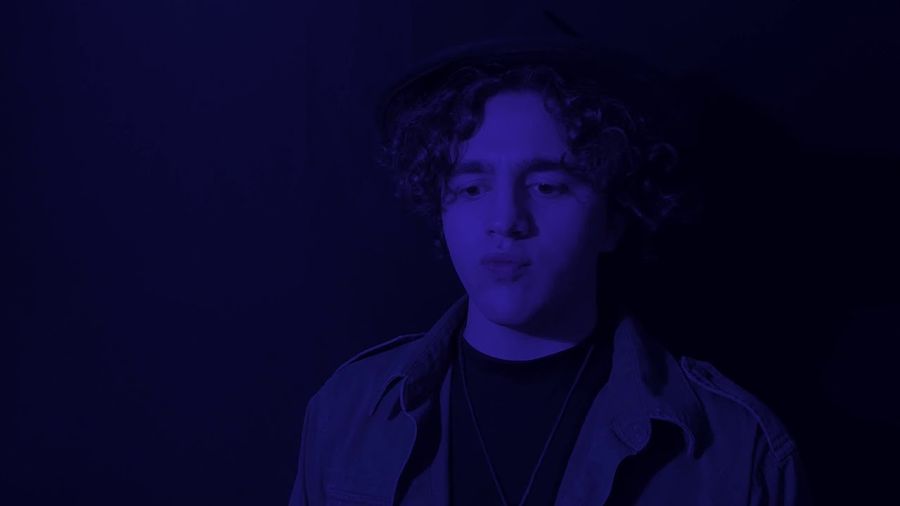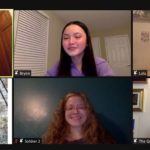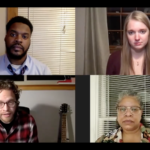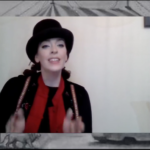When Michael Cotey announced the #ENOUGH Plays to End Gun Violence initiative in January of 2020, he couldn’t imagine the myriad ways the project would pivot and grow in this unpredictable year. #ENOUGH initially set out to give middle and high school students a platform to talk about gun violence, and an opportunity for theatre companies and school programs to connect with their communities through in-person readings and talkbacks. The readings that took place on a recent Monday, Dec. 14—a date chosen to mark the eight-year anniversary of the Sandy Hook mass shooting—were not quite as Cotey envisioned them, of course.
“I held out hope that come December we’d be able to do in-person readings, and then summer rolled on and seasons were getting canceled,” says Cotey (he/him), a Chicago-based producer and director. With his own stage projects canceled because of COVID-19, he was able to fully focus on #ENOUGH. “How do we do this? How do we change this to a ‘yes, and’ opportunity, rather than less-than opportunity?”
It was an ambitious task, but the goals and expectations for the nationwide project were far exceeded—due in part to the pandemic. The need to transfer all programming online made the project accessible to more participants. “There’s a lot of surprises that came out of this being forced to do it this way,” says Cotey.
Students from across the country submitted plays and headed up productions at their schools. Broadway On Demand streamed the virtual readings produced by regional theatre companies in every time zone in the U.S., including Arizona Theatre Company, Alliance Theatre, Berkeley Repertory Theatre, Goodman Theatre, the Orlando Repertory Theatre, and South Coast Repertory. More than 50 theatre companies and education programs, including a graduate program in India, signed on to participate.
Cotey shepherded the project through its many twists and turns this year, but he’s quick to credit the hundreds of helpers behind the scenes. He worked with an advisory committee comprising Barbara Pitts McAdams of The Laramie Project, Willa Taylor of the Goodman Theatre, and Jonathan Shmidt Chapman, executive director of TYA/USA. The winning team also included a starry slate of playwrights who selected the seven scripts that would be featured in the nationwide reading: Lauren Gunderson, Tarell Alvin McCraney, Robert Schenkkan, David Henry Hwang, and Karen Zacarías chose the winners from a pool of 184 scripts submitted from teens in 23 states.
And, of course, the teen scribes helped to bring the project to life with genre-spanning short plays that creatively tackled the topic of gun violence with harrowing soliloquys, dragons, even a four-act circus, with titles like Adelaide Fisher’s Ms. Martin’s Malaise, Eislinn Gracen’s Guns in Dragonland, Azya Lyons’s Togetha, Debkanya Mitra’s Malcolm, Olivia Ridley’s Ghost Gun, Sarah Schecter’s Hullabaloo, and Elizabeth Shannon’s Loaded Language. In addition to a digital premiere on Broadway On Demand, the students’ plays will be published and licensed through Playscripts, and the writers will receive guild membership and craft training through the Dramatists Guild’s Young Dramatist Initiative.
“This project has been successful because it is fulfilling a need that I thought was there when I started the project, but didn’t really comprehend how much people wanted to have a conversation about the topic until people started signing on all over the country,” concedes Cotey.
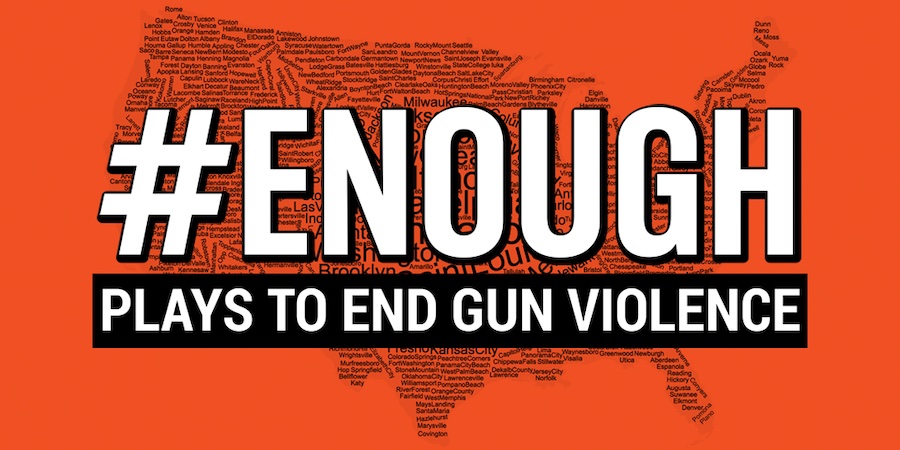
Indiana’s South Bend Civic Theatre signed on in mid-November, just weeks before the Dec. 14 reading. Executive director Aaron Nichols (he/him) learned about the project through social media, and seeing that there were no Indiana organizations involved, he sprang into action. Participating in the #ENOUGH project offered a way to bring back some of the company’s furloughed staffers, and it was an opportunity to continue working with community partners while stages are dark.
For its part, South Bend Civic Theatre collaborated with Connect 2 Be The Change, a local organization founded by parents who lost two children to gun violence. The performers included actors in the company’s network and also young change agents from Connect 2 Be The Change who were new to theatre.
“It was a joy to use this as a teaching opportunity on both sides: We learned about the realities of gun violence in our city, and they learned about the toolbox of live theatre,” says Nichols, noting that the young people were grateful for the space to talk about gun violence. “I know that that partnership will continue and we look forward to helping them tell their stories through the medium of theatre.”
Proceeds from the reading supported Connect 2 Be The Change, and a talkback featured a conversation on racial stereotyping and ways to improve the safety of the community. The mayor of South Bend, James Mueller, even attended the company’s Zoom event. “It was this really beautiful opportunity for these young change agents from Connect 2 Be The Change to really speak truth to power,” says Nichols. “They had the opportunity to have one-on-one time with the mayor of our city.”
These critical conversations were the ultimate goal of the project, and the ripple effects of the #ENOUGH readings and conversations are continuing throughout communities throughout the country. Last week the Memphis Public Library streamed the Broadway On Demand videos with their patrons, and the mayor of Santa Fe held a meeting with the police department about gun violence and presented one of the #ENOUGH plays as part of the convening.
The real marker of success, though, is seeing how the students have taken up the mantle of leading these conversations in their respective communities. “This project has the potential to have a major impact on the young people who get involved in it,” says Cotey. He points to Avery Hamill (they/he), a sophomore at AIM Academy in Conshohocken, Pa., who brought together students from across the state in the Students Demand Action (SDA) organization to produce an #ENOUGH reading.
Hamill, the co-lead of AIM SDA chapter and the president of SDA Philly, served as a student producer for the #ENOUGH event and partnered with drama teacher Maryanne Yoshida (she/her) in organizing the weekly virtual sessions, which included penning plays in addition to rehearsing the seven selected #ENOUGH plays.
“I ended up having this opportunity to volunteer with a completely different group of students through Students Demand Action,” says Yoshida, who also serves as Hamill’s mentor in the Global Scholars program. Working on the project with her own students and other young people involved in SDA was a boon to her remote teaching schedule. “I started meeting kids from across the state of Pennsylvania…these young people who have such hope and such dedication and who are making changes daily—they are doing the work. They just inspire me.”
And Hamill was grateful for the opportunity to introduce their SDA peers to theatre. “Though my work with SDA, I have been trying to show gun violence and hit the heart,” says Hamill. “Writing plays helped to show our community the ways that gun violence affects us other than just facts and numbers. It was able to hit home because it was stories and not just hard numbers.”
Moving forward, Hamill and Yoshida plan to update the school’s spring curriculum to continue the weekly conversations and playwriting sessions. When it is safe to do so, the school plans to mount the seven #ENOUGH plays—plus the three penned by local students—onstage. They also hope that members of the local Moms Demand Action group will Moms Demand Action will serve as panelists for future performances to help educate and guide the conversations. For their part, Hamill will “keep the dissent going in the new year. We plan to invite moms and students to ask more questions…I personally will keep writing and sharing information in any way I can to my wider community and to reinvigorate the amazing volunteers we have at SDA Philly.”
When Cotey set out to spread the word about this initiative and project, he had an end date in mind. But it is clear that there is momentum to keep going, and that the one-time #ENOUGH reading wasn’t enough. “I’d love for there to be a reason for this project to end, but unfortunately, you know, in a year with COVID, we have the worst year of gun violence on record,” he says. “This issue is not going to go away anytime soon.”
For its next iteration, Cotey will move the project’s date based in part on feedback from some gun violence prevention organizations, noting that the call to action on a day of mourning caused some disinclination to participate. “There was some reluctance to get involved, and that’s something that I will know to consider more closely for the timeline for the next project,” he concedes.
Cotey also notes that a few of the schools backed out of this year’s event due to the heady topics layered on top of the challenges of remote learning and year-end exams. “Students are in a pretty fragile space right now,” Cotey concedes. “This year has been really stressful, and some schools found that engaging in this material was not the thing that they needed to focus on right now.”
In a post-COVID world, Cotey hopes #ENOUGH can reach more schools and theatre companies. He plans open submissions in the fall and to produce another nationwide reading in the spring to coincide with school year calendars and hopefully the reopening of theatres.
“There is something to the spirit of what we did,” reflects Cotey. “When we get back to doing theatre as usual, or close to normal, I would hate to lose the spirit of the many companies who were able to pull in artists from all over the country for these readings.”
Allison Considine (she/her) is senior editor American Theatre. @theatric_ally

